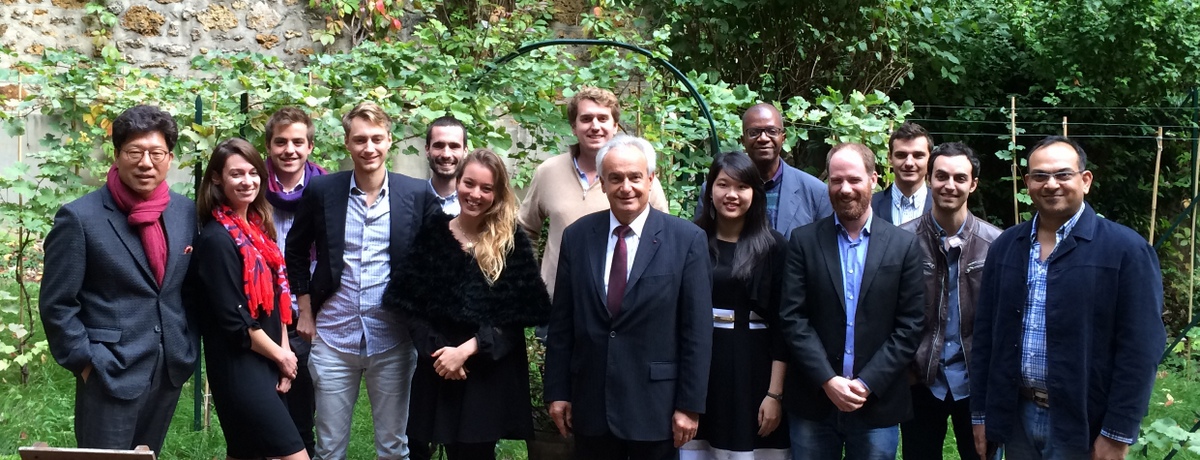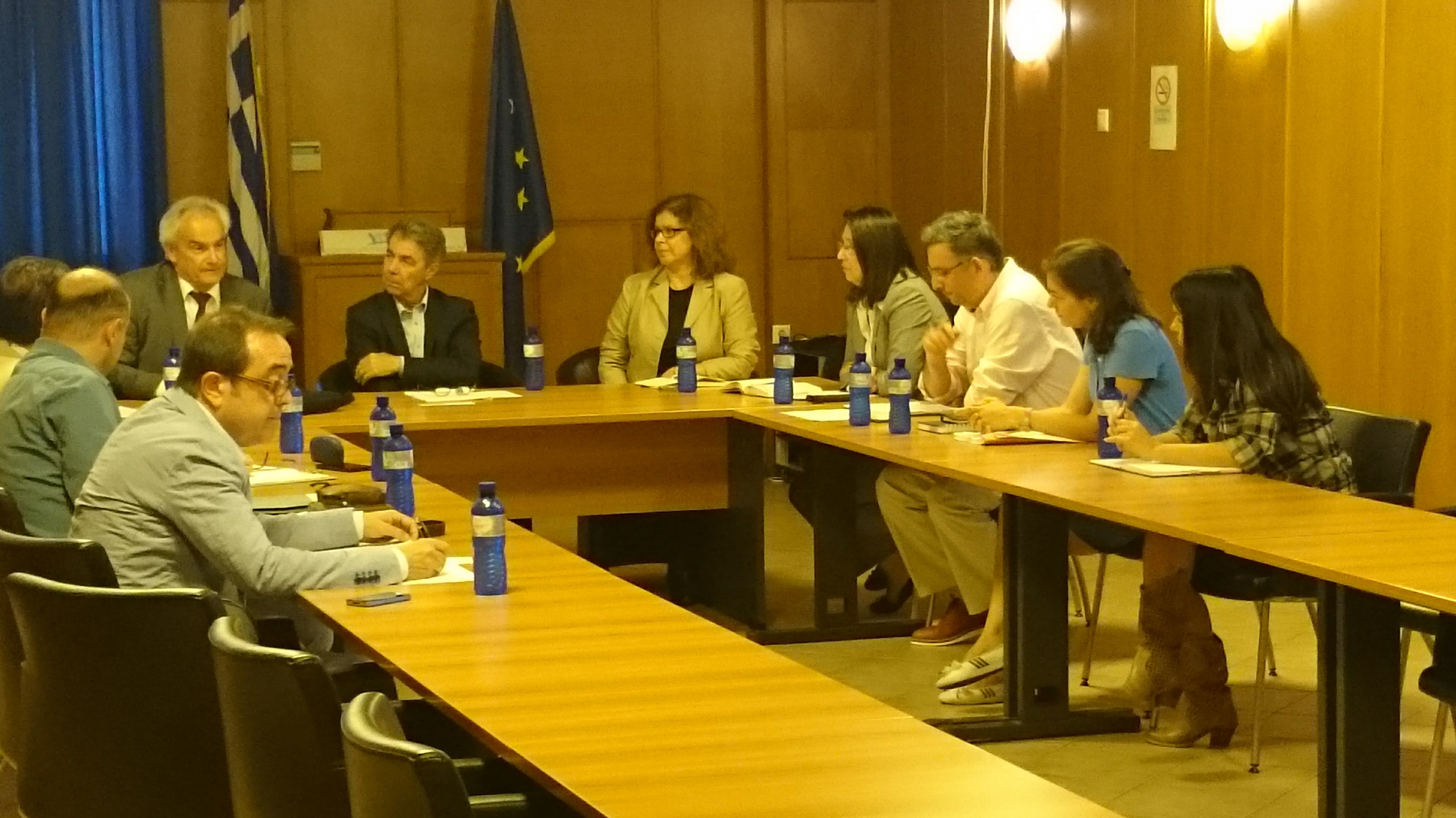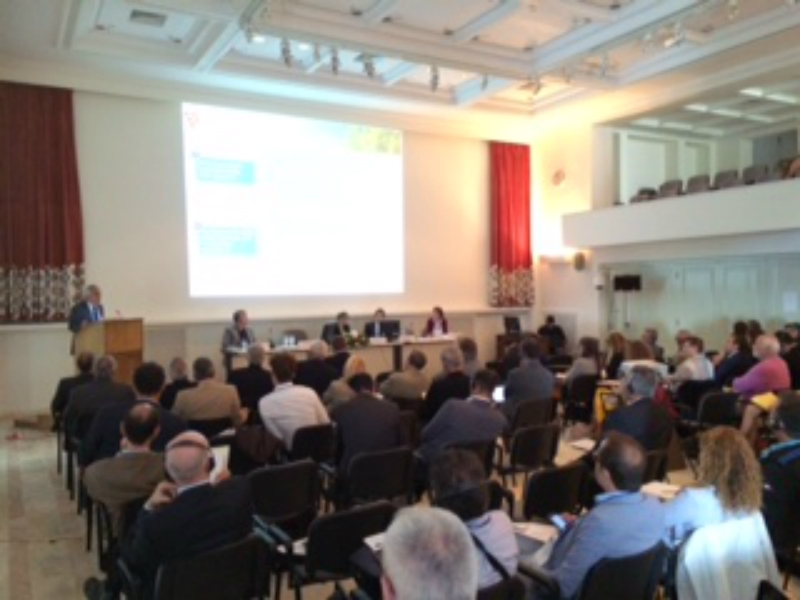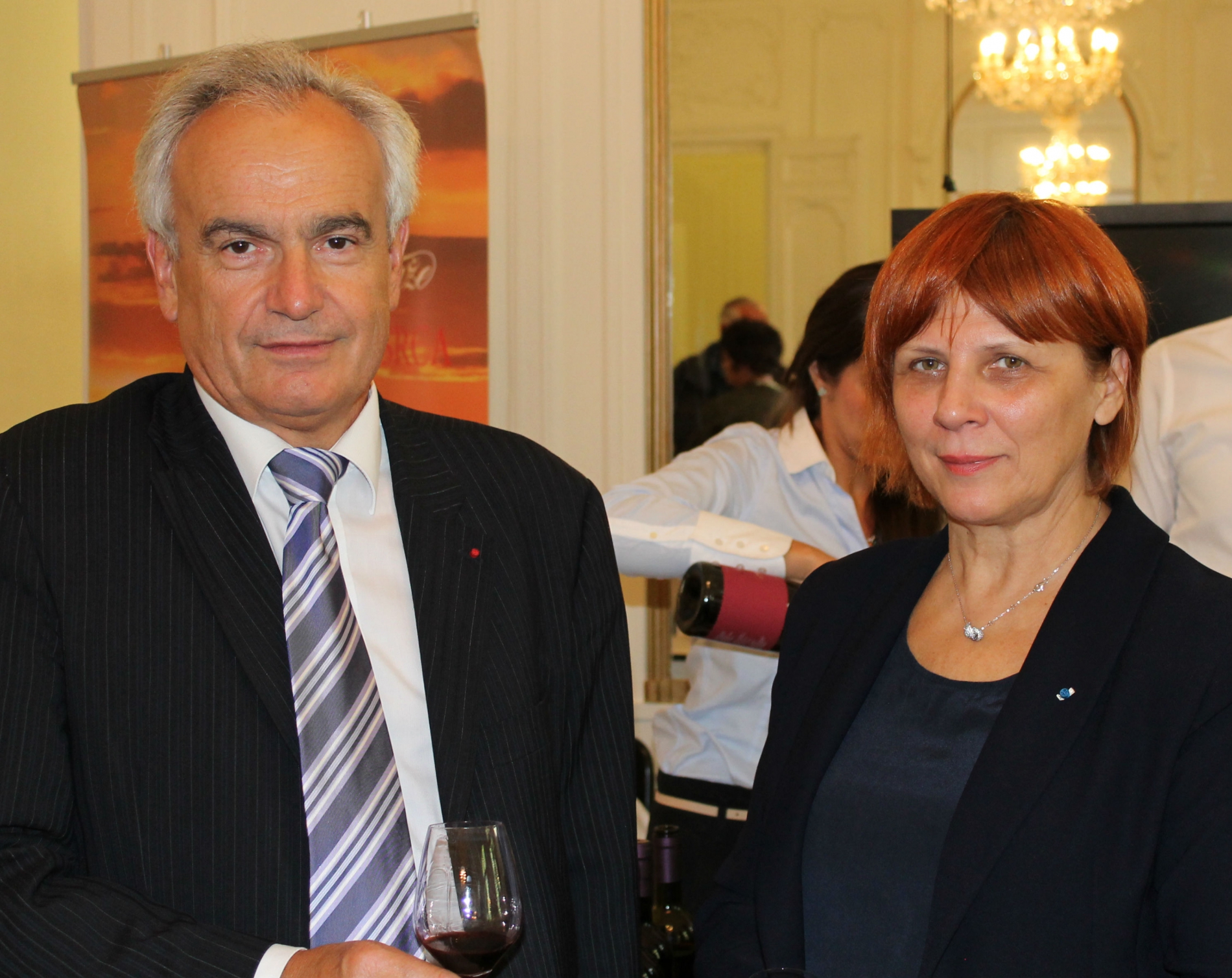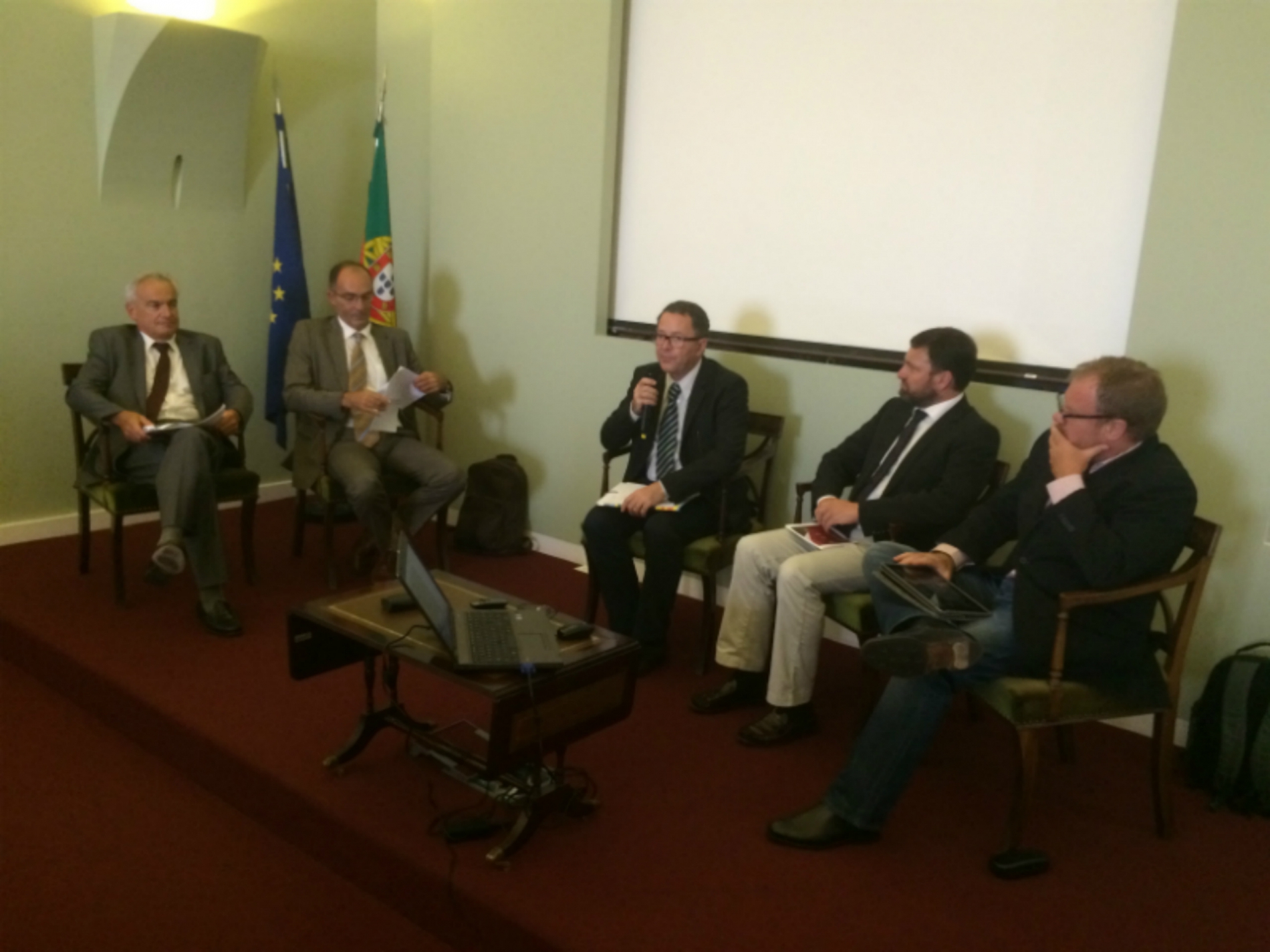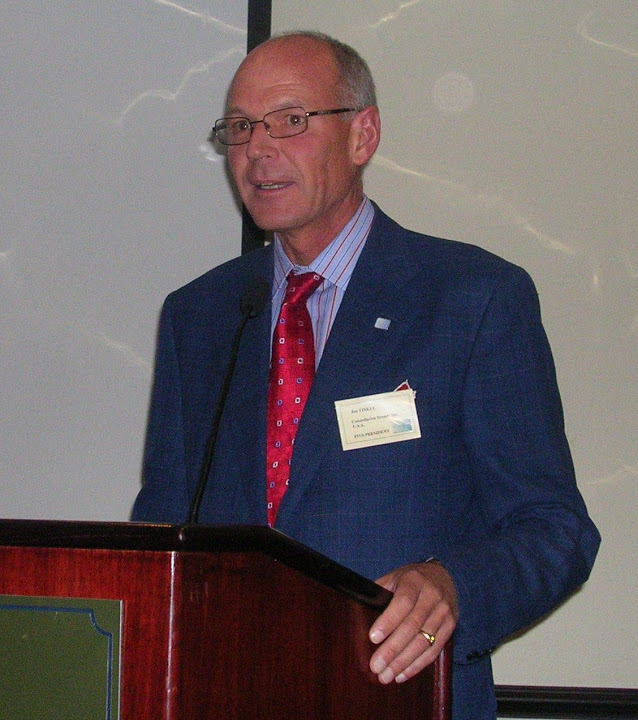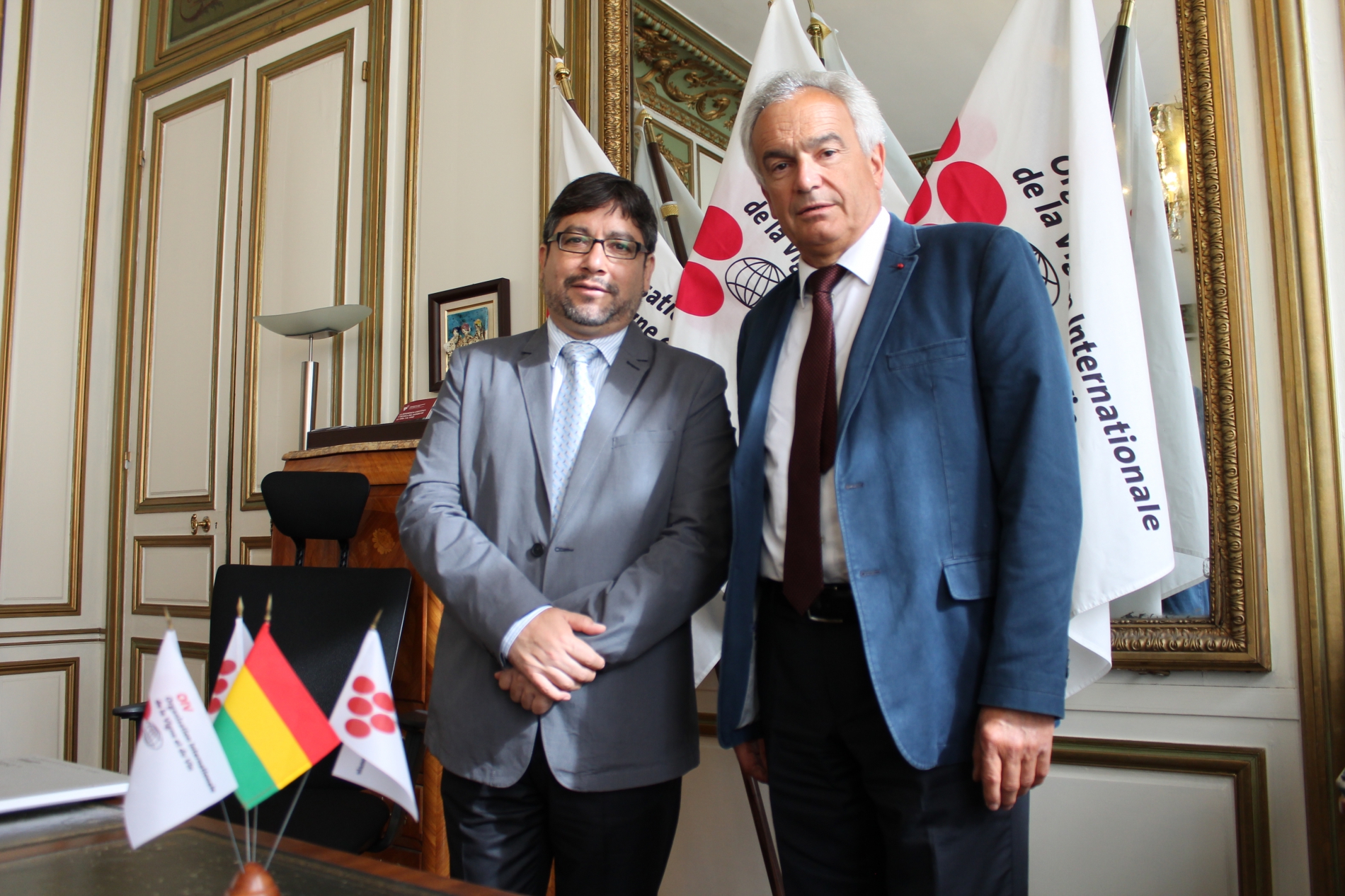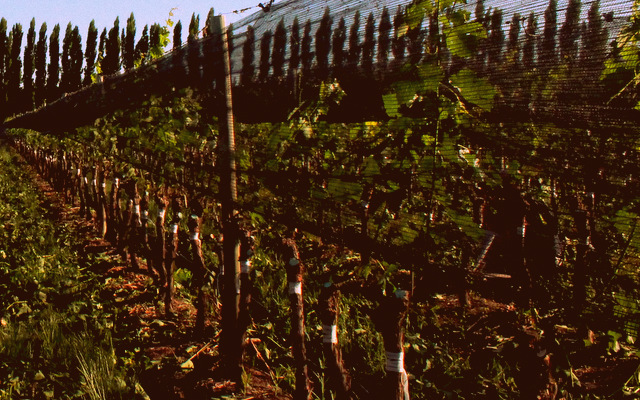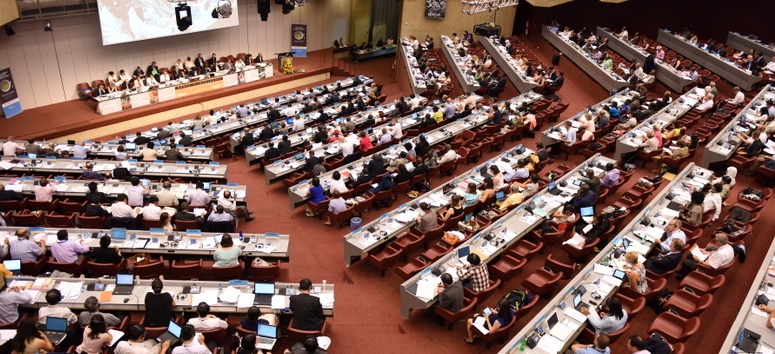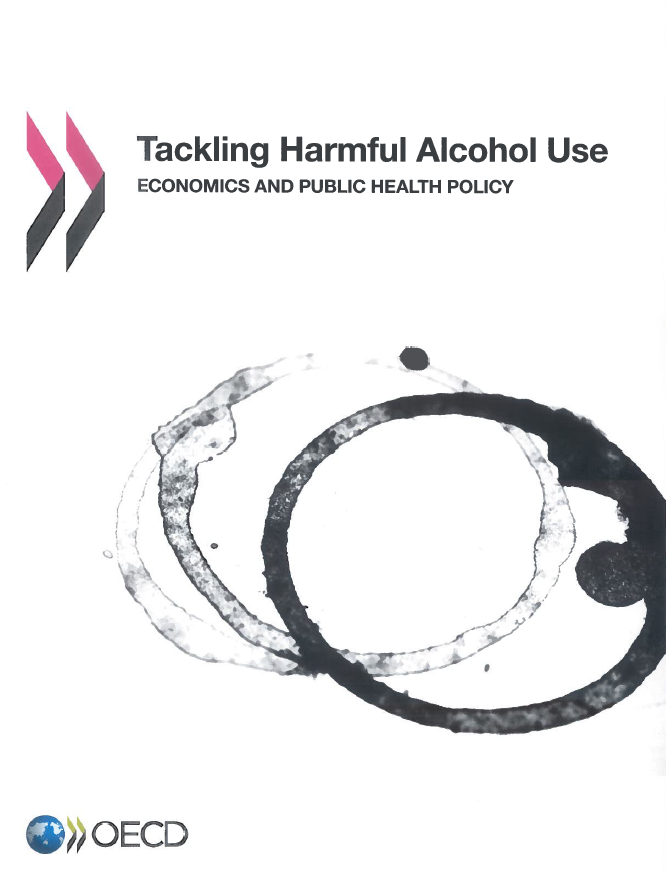09 Oct 2015
Following an introduction to the OIV and its activities by the various heads of unit, they were received by Director General Jean-Marie Aurand who stressed the original character of this training and the openings to which it gives rise, thanks to the network of universities and companies associated with it. This diploma is unique in that its field of study is at one and the same time single-sector, multidisciplinary, itinerant, international and experimental, while drawing on one of today’s most highly developed networks in the wine world. Since 1987, more than 500 “movers and shakers” in the wine world have received this training.Before the members of this class left OIV headquarters, Jean-Marie Aurand insisted on the international dimension of a course which every year enables students to discover more than 20 key countries in Planet Wine, situated on 5 continents.
09 Oct 2015
In the course of a working meeting attended by, inter alia, Ms Chrysoula Papadimitriou, Director for Rural Development and Food, Ms Evangelina Komenta, delegate to the OIV, Mr Yannis Voyatzis, President of the National Inter-Professional Organisation for Vines and Wine and Mr Theodore Georgopoulos, Director of the Greek Wine Federation, the Secretary-General spoke of Greece’s contribution to the work of the OIV (of which Greece has been a member since 1929) and confirmed the country’s unstinting support for the Organisation. He went on to speak of Greece’s firm intention to develop its viticulture by upgrading wines produced from native varieties, which are part of Greece’s historical heritage. Mr Jean-Marie Aurand gave a presentation of the OIV’s Strategic Plan and expressed his pleasure at the active presence of Greek experts in the organisation and the delegation’s contribution to the decision-making process. He drew attention to the importance the OIV attaches to maintaining the diversity of vine and wine production and improving and upgrading native varietal wines by means of the research and development programmes now being carried out in many countries.
With 110 000 hectares planted to vines, Greece produces some 3 million hectolitres of wine under highly varied soil and climatic conditions.A land with a millenary wine tradition, Greece has succeeded in building up a modern viticulture sector with international vine varieties while at the same time continuing, from among nearly 300 local varieties, to produce unique wines based on Assyrtiko, Moschofilero, Agiorgitiko or Xinomavro grapes. It is also the land of the Cretan diet, based on cereals, olive oil, vegetables and world-renowned wines.
03 Oct 2015
This speech in the context of a panel devoted to the harmonisation, mutual recognition and impact of the various bodies of international regulation governing the wine market outlined developments in wine law over the past thirty years. This international meeting gathering brought together in Santorini, Greece, a hundred or so jurists from 20 countries, on the occasion of the 30th anniversary of the founding of the A.I.D.V – I.W.L.A ., to discuss legal topics connected with the introduction of new technologies, the protection of geographical indications, the protection of vine varieties, international trade conflicts, counterfeiting and Internet, planting authorisations and the law governing successions. At this meeting, the President of the A.I.D.V – I.W.L.A ., Rein-Jan Prins presented members with the results of an international survey among the membership, which showed the vitality of the Association and the importance of this network with its 300 jurists in some thirty countries. A special role to which Jean-Marie Aurand drew attention, while expressing pleasure at the activity of this organisation with observer status in the OIV and stressing that the vine and wine sector was unique in benefiting from a worldwide network of specialised jurists.
29 Sep 2015
This presentation was organised by the wine company Jul Plantaze and the National Wine Growers’ Association, and involved eleven wine-producing companies.
Montenegro produces high-quality wines from native grape varieties such as Vranac (red) and Krstac (white).With the Plantaze company, the country possesses the largest wine estate in Europe with more than 2300 ha of vines and 17 million bottles produced per year, of which much is exported worldwide. A Member of the OIV since 2007, one year after the country’s independence, Montenegro is carrying out a proactive policy of modernisation and promotion of the vine and wine sector, involving in particular the development of wine tourism, the upgrading of its vine and wine heritage and the promotion of its terroirs.
14 Sep 2015
The work that brought together international marketing and communication experts alongside producers and wineries from Porto was followed by tasting sessions. A symposium on the role of Port wine and Douro wines in the local economy extended the discussions to 11 September.
On this occasion, the OIV Director General, Jean-Marie Aurand, spoke up about the place of science and innovation in the wine sector and the role of the OIV in this context.With nearly 24,000 producers, the Porto region makes the most renowned liqueur wines in the word, shaping the countryside with the characteristic terraces that were recognised on the World Heritage of Humanity list by UNESCO in 2001 as evolving, living cultural landscapes.The Douro region is spread across 250,000 ha of schist soils, with 44,000 ha of vines producing the Port and Douro designations of origin.Douro is the oldest delimited and regulated wine region in the world, dating back to 1756. Port wine may be tasted in around 120 countries on all 5 continents. It represents a significant part of the Portuguese vitivinicultural economy.
07 Sep 2015
Former president of the International Federation of Wines and Spirits (FIVS) for almost 17 years, Finkle boosted the Federation to impose its place in the vitivinicole’s industry, particular as an active observer to the OIV and the Codex Alimentarius. The OIV wishes to pay tribute to the memory of a passionate man who has been entirely devoted to the improvement of the world’s vitivinicole industry and would like to extend its deepest sympathies to his family. James FinkleJames P. Finkle served as the Chairman of the Board of Managers of FIVS-Abridge, a comprehensive interactive online database of regulations and international agreements for the wine industry. He retired as Senior Vice President, External Affairs, for Constellation Brands, Inc. and was a member of the Executive Committee of the Distilled Spirits Council of the United States. Additionally, Mr. Finkle was on the Board of Directors of the Wine Institute, Wine America, and the Associated New York State Food Processors and assisted the US Department of Agriculture’s Technical Advisory Committee for Trade. He received both his Bachelor of Science Degree and his Master of Science Degree from Cornell University, both degrees in Viticulture and Agricultural Economics.
01 Sep 2015
Bolivia, who was a member of the Organisation from 1993 to 2004, is one of the signatory States to the Agreement of 3 April 2001 but has not yet formally ratified it, partly due to the reforms it has made to its national constitution in recent years. The Director General of the OIV highlighted the defining features of Bolivian vineyards, namely the "vinos de altura" (wines of altitude) or Singani spirit, which are significant elements of South America's vitivinicultural heritage and should bring the country's vitivinicultural sector to rejoin the global wine community within makes up the OIV. H.E. Mr Guevara Ávila indicated that the accession procedure is underway and that he hopes that it would be completed by the end of the year 2015.
27 Jul 2015
Grapevine trunk diseases (GTD) have become a real problem during the last years.OIV also, has started up again the work in this sense according to its Strategic plan and work program, which first action was settled down in 2006 (VITI 02/2006 resolution) but some actions are needed nowadays in order to complete this resolution about preventive measures.It is important to underline that this topic is evaluated by several initiatives and actions developed at national or international level. The OIV Secretariat general has wished to elaborate a document underlying the importance of this topic, the ongoing works and the need for an international cooperation.Download document (in English)
27 Jul 2015
During this meeting, the Codex Alimentarius Commission adopted several standards, some of which have a direct impact on the international vitivinicultural sector.
With regard to additives in wine (category 14.2.3), the Member States of the Codex Alimentarius approved the inclusion of carbon dioxide among those subject to GMPs, with the following note: “The CO2 content in finished still wine shall not exceed 4000 mg/kg at 20°C”.Four additives, regarding the "Grape wines" category in particular, were added to the priority list of the Joint FAO/WHO Expert Committee (JECFA) for toxicological assessment. These were, namely, tannins, yeast mannoproteins (INS 455), potassium bisulphite (INS 228) and metatartaric acid (INS 353). Furthermore, the Commission adopted a number of Maximum Residue Limits for pesticides used in the production of table grapes or dried grapes.The existing limits for these pesticides, listed below, were revoked and replaced by the following limits:Note: With regard to MRLs, the OIV Secretariat has put together a list of online links on the website www.oiv.int. The list includes information available concerning maximum residue limits applicable to grapes (table, wine and dried grapes) and to wines (where relevant). This information is based on:
- notifications from Member Countries, as requested in adopted OIV resolutions,
- notifications made by countries to the WTO,
- other sources: Codex Alimentarius, EU, the USDA MRL database.
23 Jul 2015
This book provides a detailed examination of trends and social disparities in alcohol consumption. It offers a wide-ranging assessment of the health, social and economic impacts of key policy options for tackling alcohol-related harms in three OECD countries (Canada, the Czech Republic and Germany), extracting relevant policy messages for a broader set of countries.This book is divided in 6 ChaptersChapter 1. Alcohol: The public health side of a social phenomenonChapter 2. Trends in alcohol consumption in OECD countriesChapter 3. Social disparities in alcohol drinkingChapter 4. Tackling alcohol-related harms: What policy approaches? Chapter 5. Health and economic impacts of key alcohol policy optionsChapter 6. Alcohol, the individual and society: A caIl for coherent alcohol policiesRead the OECD Report: Sassi, F.(ed.) (2015), Tackling Harmful Alcohol Use: Economics and Public Health Policy, OECD Publishing, Paris.DOI: http://dx.doi.org/10.1787/9789264181069-en
